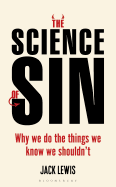
In The Science of Sin: Why We Do the Things We Know We Shouldn't, neurobiologist and self-professed atheist Jack Lewis takes a close look at sinful behavior to explore the brain circuitry behind some of our most extreme actions.
Lewis defines sin as conduct that might be fine in small quantities but crosses over into antisocial behavior if indulged in too much. For example, a healthy dose of envy, or "benevolent" envy, can be an excellent motivator for self-improvement, whereas in extremity it can lead to destructive or criminal behavior.
The chapter on lust is where things get really interesting. While necessary for procreation, natural lust can morph into vice if it involves adultery, porn addiction or worse. Lewis explores the neurological processes that lead perfectly responsible people to succumb to temptation despite their better judgment. As part of his analysis of deviant sexual behavior, Lewis describes the neurological anomalies present in the brain of a pedophile, both in structure and function, that explain but do not excuse the behavior. In fact, Lewis doesn't let anyone off the hook with the excuse "my brain made me do it." Instead he cautions those with a biological propensity to "sin" to be extra vigilant, work harder on self-control and exercise proven strategies for more thoughtful engagement with the world.
Whether one believes in Dante's vision of hell or prefers to understand sin in a philosophical context, the fascinating insights into human behavior gleaned from The Science of Sin are sure to impress friends and family at one's next social gathering. --Shahina Piyarali, writer and reviewer

